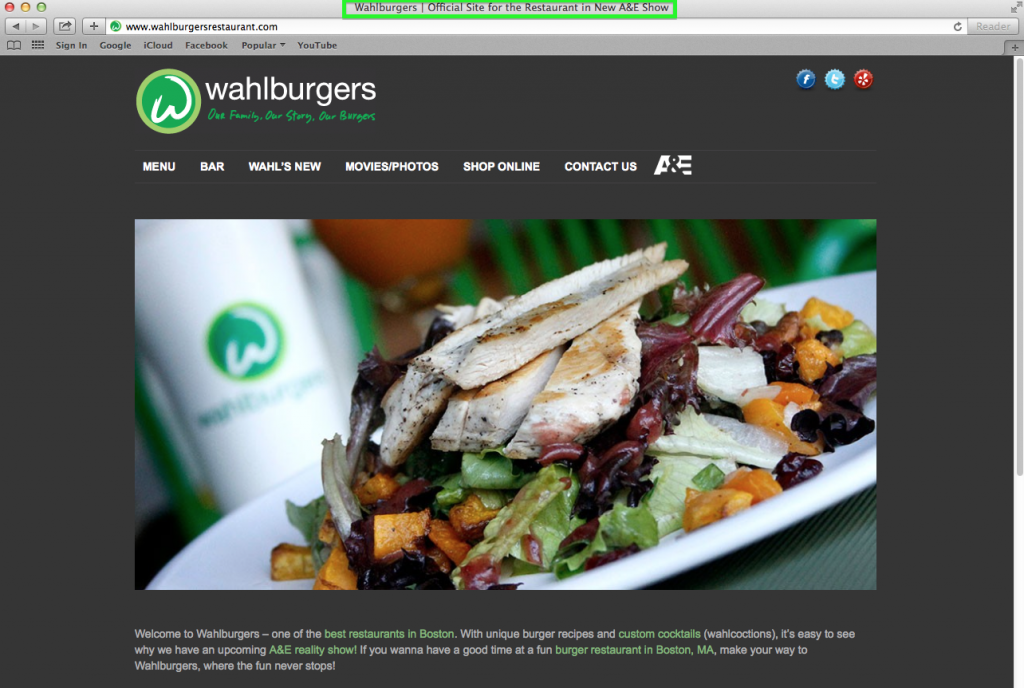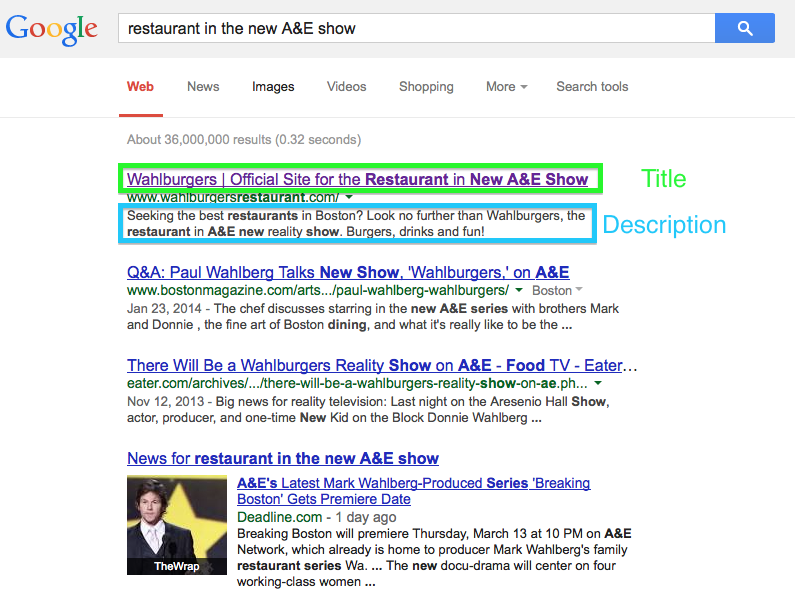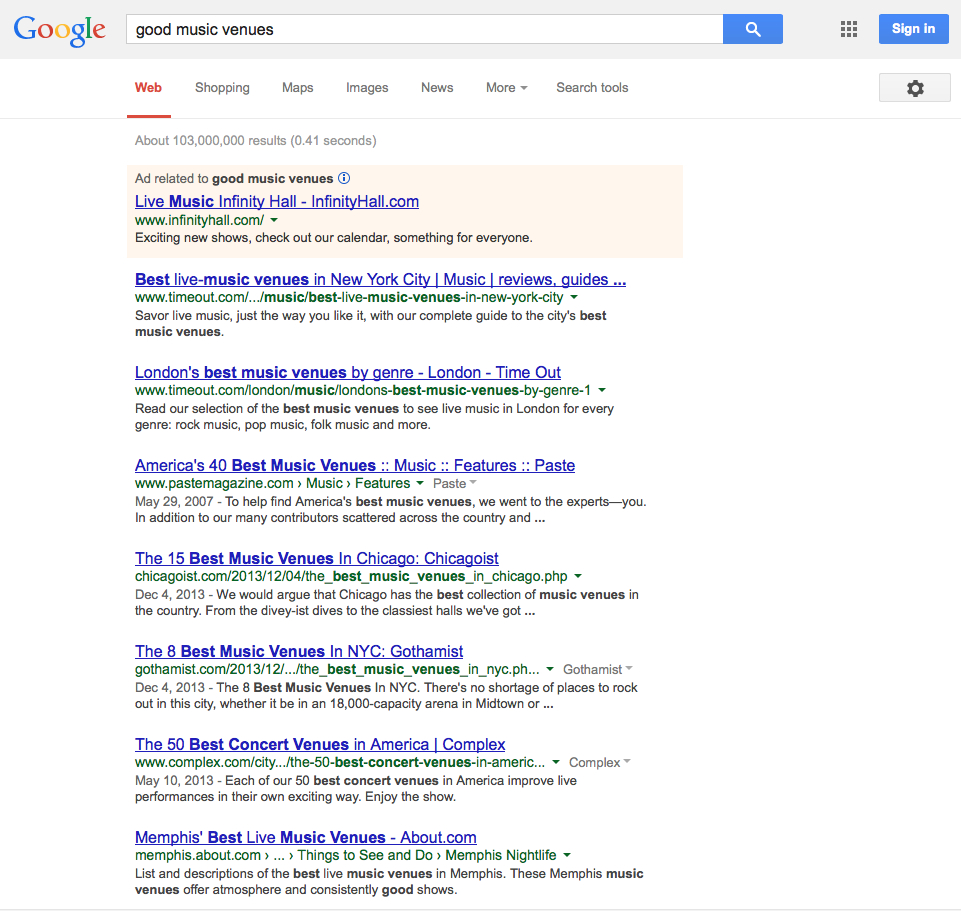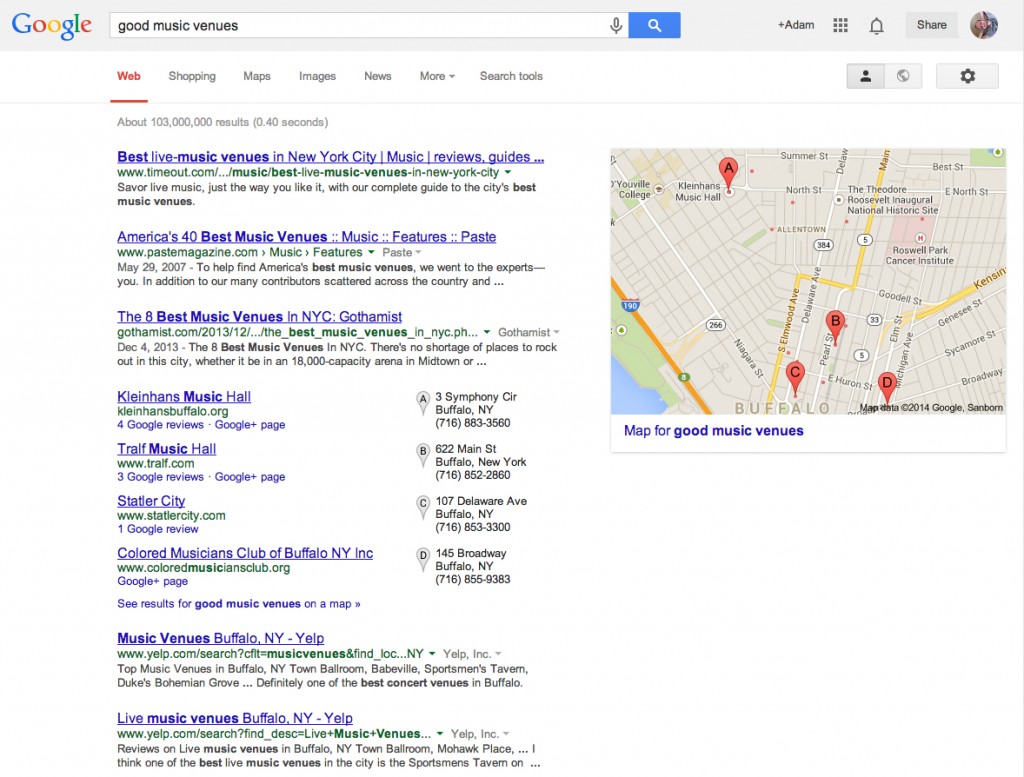A TMG Search Engine Optimization (SEO) Primer
You may have noticed on our services page a new section called “Content Marketing.” In many people’s eyes, this is a more accurate term for the traditional term: search engine optimization. The reason being that, modern SEO is based around content – good, solid, helpful, fresh content.
That being said, I want to provide our clients with a trimmed down introduction to SEO so that they can understand the basic principles and purposes associated with the practice. You can find a lot of sources that talk about this, the most accurate being Moz’s beginner’s guide to SEO. Of course, Google offers resources as well, but these can be difficult to navigate, as they offer such a large amount of information.
Many other sources leave out important aspects or even give incorrect info about SEO. It’s not like astronomy or English classes, which have well defined rules (and exceptions) which authorities have developed through centuries of research. SEO has only existed since the inception of search engines in the late ’90s, and it lacks the organization of other more recent disciplines, such as website coding, for which you can take classes at most educational institutions. Therefore, finding correct info or purely necessary info can be difficult.
So, here’s some info to get you acquainted with search engine optimization:
SEO Definition
SEO is the practice of getting your website to appear in search engine results for relevant phrases in order to bring in business. The term “keyword” might come to mind. However, I find this to be a confusing term, since it applies to an outmoded meta tag (see next heading) and it narrows thinking to single word searches. Users typically search with phrases, such as “Buffalo Apartments for Rent” for which an apartment renter in Buffalo would hope to populate in Google. People used to get away with employing shady tactics, known as “black hat” SEO, in order to get websites to appear for relevant or even irrelevant terms. In response, search engines have refined their algorithms in order to avoid displaying low quality sites which have little or nothing to do with the user’s search phrases.
Therefore, modern SEO focuses around tactics with longevity, in order to increase user experience on your website. We accomplish this in a lot of ways, but you can think of SEO thought process as this: better user experience >> better search rankings >> more users >> more revenue. Keep in mind that this flow chart is an oversimplified model. However, it points out something important, you must begin with user experience, or else all that follows will dwindle.
Meta Data
While on-page content matters more than almost anything in modern SEO, meta data offers a good starting point for any SEO strategy. The meta title and description tags offer concise methods of summarizing any page on your website, providing a place to stress the most relevant terms and to give a solid first impression on search engine users.
But what is meta data?
Meta tags appear in the code, but not on the page. You can see the meta title tag in the browser, however (note the top of the Safari browser below):
Google users will see this, along with the description tag in the search results for “restaurant in the new a&e show”:
Therefore, crafting your meta tags matters. You have to play a weighing game between search phrases and branding. Both matter, because you want people to find your site, but you also want to reflect your brand persona in the search results.
One good method to try: stick with branding (to some extent) in the Home Page meta tags. If you have a 5 page website with a blog, you have 4 other pages and unlimited blog posts to focus meta on search phrases. However, the home page is always the most likely to appear in search results. Therefore, other pages can focus on relevant verbiage, while the home page reflects your brand ideals, etc.
Site Content
In some sense, content is where SEO begins – as you must first create a website before you can optimize it. However, it comes after meta data on this list, because users will see meta data in search engines before they see your website. Google, however, will see your website as a whole before applying algorithms to determine your search ranking.
Put simply, content is everything that appears on a web page. Text, photos, videos, navigation, etc. You can’t really say that content only refers to the text on a page or that the text is even the most important aspect of content. That being said, the text is the easiest thing to manipulate (for better or worse). Therefore, typically when I refer to content, I mean text, although I also mean everything else in the back of my mind.
Because it is everything on the page, content is your main avenue for developing a positive user experience. Writing text that offers helpful information, as opposed to annoying solicitation, encourages users to stay on your site. Having concise, easy to understand content will go a lot farther than keyword-stuffed, convoluted, jargon-filled nonsense.
Include images to draw the eye where you want it to go. Put thought into layout, in order to make it easier to obtain the information. Simplify your navigation by reducing page count to necessary info and keeping other stuff for the blog. Some of this applies to your web development team. Some of it applies to your content writers. Some of it comes down to you, as a business owner, coming to terms with the best button on a keyboard – the delete key. In other words, you have to be willing to spare users from excess information that only serves to overwhelm, confuse and deter further navigation.
Fresh content also encourages better search placement, which is why a blog is so important. Consistently updated content in a single feed makes a great source of current information for users, therefore Google likes to see these kinds of postings on a website. These posts also make great places to include search phrases in both content and meta data. Linking phrases in posts to relevant pages on your website allows users to get to additional helpful info, which Google likes to see as well. Avoid excessive linking, especially to irrelevant pages. You’d think robots wouldn’t know the difference, but as it turns out, Skynet has already gone live and we are all screwed.
Social Media
Social media is an entity in and of itself, which is why The Mac Groups focuses most of our energies toward it. However, without social media, you can expect your SEO to either dwindle or fail entirely.
Social media provides a way for businesses to interact with users. It’s not just a means of disseminating information or ads, it’s a way to make customers feel that you actually care about them. Therefore, it enhances user experience and provides another avenue for people to find your website. With a successful social media campaign comes improved search engine results. If you get people sharing your links, photos, and other content, you multiply the links going back to your social media page and your website, all of which search engine robots track. It is the absolute best way to get people involved, so do it.
Organic Linking
There was a time when linking schemes worked and bad websites with little to no content had fantastic search results. Thankfully that’s all changed, for several reasons, one of which being that we don’t have to pursue thousands of inbound links in order to get good search rankings. Another good thing is that, we can focus on making great websites and having people link to our sites because, get this, our sites are actually cool.
So, welcome to the world of organic linking. Don’t let anyone make you think that links don’t matter. They matter in two ways
- Tons of low-quality links will hurt your rankings
- Several high-quality links will help your rankings
Therefore, welcome links from sites ending .gov, .org and .edu. Donate to charity, and hope that they link to your business as a thank you. Offer insightful scholarly information that local academic institutions will link to. You’ll notice that these sorts of links are born out of good content, so really, modern linking strategies (if you can call it a “strategy”) are an extension of your website’s quality and your involvement as a business with your community.
Analytics & Webmaster Tools
Lastly, Google Analytics and Webmaster Tools act as incredible resources to track the progress of an SEO strategy. You’ll notice that I don’t include the word “ranking report” in this heading. That’s because a ranking report only gives a sliver of information about how your SEO works. Through Analytics, you can track your actual new visits from organic search, which is so much more important than where you place in search results for the phrase “local florists in Williamsville, NY.”
The reason for this being the following… I can go into Safari or Chrome, clear my browser data, and do a search for some term – let’s say “good music venues.” I’ll do that now…
Now, what if I perform this search in the browser that has all a ton of data of my recent searches, interests, social media accounts and email?…
Looks a little different right?
As I said, Skynet is pretty advanced. Google tailors results to the specific user. So, if I do a ranking report for a company and they don’t show up until page five for a term, I could (and usually do) still see in Analytics or Webmaster tools that they’ve had first page placement for the term on several desktops, tablets or phones.
That being said, I still aim to get first page rankings in a clear browser, as this is still a good indicator of SEO success – but not the only indicator. Because I might have aimed for placement in a search for “Buffalo wedding florists” and not quite succeeded, while Analytics not only shows clicks for that term – but for “Buffalo NY wedding florists,” “wedding florist in Buffalo NY,” “Buffalo bridal flowers,” and so on.
That is just a sliver of info that you can get from Analytics, by the way. I will probably look to cover far more in the future…
Conclusion
SEO is a constantly changing practice, involving many fluid processes and a lot of teamwork. The most important take away that I hope you get is that we have a huge blessing from modern search engine algorithms: we get to devote our time and finances to making cool, helpful, good looking and easy-to-use websites instead of focusing on link schemes, keyword stuffing and other dishonest practices. We get to focus on making good impressions on users and helping them with insightful information and intuitive design. In a way, this might be more difficult than old style SEO.
However, while it might take more energy, it’s energy well spent, because we end up helping people and enriching our communities. And, that’s a pretty cool benefit to gain in addition to the end goal of return on investment.
—–
Find me on Google






